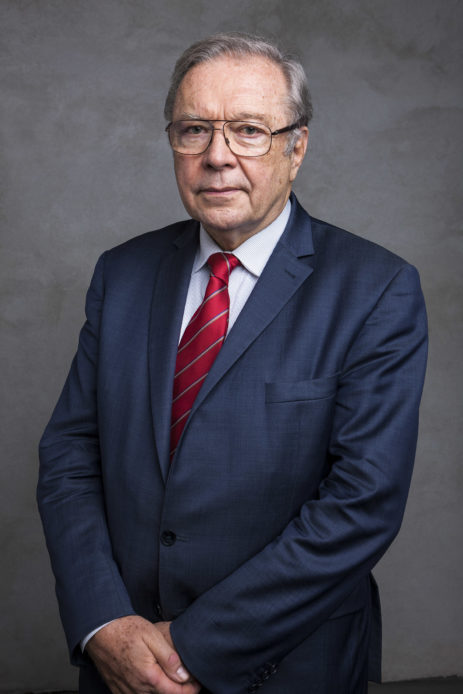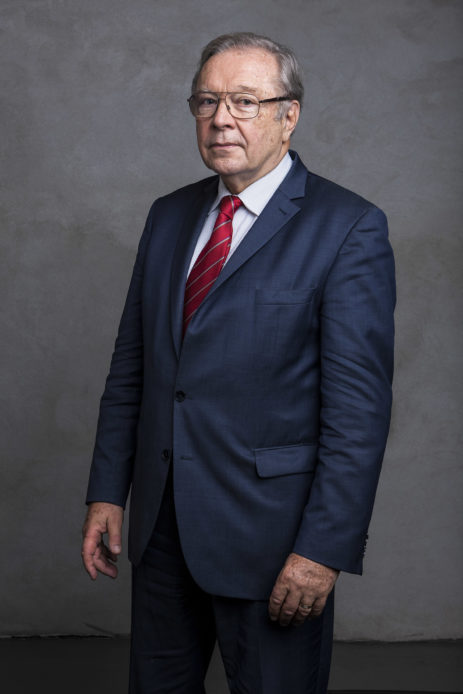MEMBERS

fot. Rafał Placek/GILDIA REŻYSERÓW POLSKICH
One of the most important Polish directors, Zanussi enjoys international recognition almost from the start of his career. His 1971 feature “Family Life” was screened at Cannes; he returned there nine years later to win the Jury Prize and the Prize of the Ecumenical Jury for “Constans”. “Imperativ” (1982) was wildly successful in Venice, as was “Year of the Quiet Sun” (1984). “Camouflage” (1977) and “Life As a Fatal Sexually Transmitted Disease” (2000) both won the Golden Lions. Zanussi is a member of the European Film Academy.
Krzysztof Zanussi
He’s not afraid of using his unique voice. He is a cinema intellectual and carries an ethos that comes with that label around these parts. On screen, he shows people like himself, who ask fundamental questions about faith, obligations towards society, morality, approach towards reality. He had watched these people’s attitudes towards the previous political system, and now diagnoses them.
“I had incredible luck in life,” – says Krzysztof Zanussi to me. “I have managed to be an auteur for three decades. In retrospect, I might like some of those films more than others, but they all bear my mark. And having had the opportunity to develop my own style in today’s world gives me a sense of fulfillment.”
Because even though he is 77 years old, he still wants to keep up with the times. “We live in a particularly good era” – he claims. “Poland has never before been so prosperous, safe, and just. You can live a carefree life in this reality. But a lack of reflection has never yielded anything profound. And I think profoundness is an absolute value. We need to keep striving to reach higher planes of existence, to get the sense like we understand our fate, even if just for a split second.” No wonder then that Krzysztof Zanussi is skeptical of the current commotion.
“We need to keep striving to reach higher planes of existence, trying to for at least a split second get the feeling that we understand our fate.”
He was born in an intelligentsia family in 1939. Barely three months later, the war began. It left the first marks, and the deepest scars on his psyche. Images that, as he later admitted in interviews, would often suddenly return to him years later. He grew up during rising authoritarianism and Stalinism, in a system that hated everything he held dear. Which is maybe why he was looking for an escape? He studied languages and apolitical physics at the Warsaw University. Until he realized that his place was elsewhere.

fot. Rafał Placek/ GILDIA REŻYSERÓW POLSKICH
After a brief dalliance with philosophy, he finally got into the Lodz Film School. From the start, from his phenomenal etude “The Death of a Provincial” (1966), he knew what interested him. In his work, fundamental musings about the relationship between man and nature, the Divine, and basic philosophical questions, were reflected in everyday situations. Hounded intellectuals had to come face to face with a disgusting reality. They tried to defend their values at various worker’s meetings and within the confines of communist era flats, among wall units. At the same time, Zanussi was not afraid of experimenting with form, disrupting classic storytelling in order to show people taking stock of their lives at critical turning points.
Each new film was an important statement. in “The Structure of Crystal” he studied the fate of two friends from university, in “The Illumination” he showed a physicist troubled by a feeling of existential emptiness, in the TV film “Behind the Wall” he told the story of two people fascinated by science, but separated by everything else. Already in those early films, we can spy his trademarks: his ability to talk about values very seriously, but also, say, his love of mountains. And his excellent actors. They would accompany him throughout his career: Maja Komorowska and Zbigniew Zapasiewicz, whom Zanussi’s films will make the face of the Polish intellectual.
In 1977, the artist made one of the most important films of the cinema of moral anxiety – “Camouflage”. It is another insightful tale of academic life, and – above all – about two conflicting attitudes towards life. About the unfair struggle of cynicism against idealism in a crooked world that forces people into dirty deals and amoral dependencies.
These films also reflected the director’s dilemma as an intellectual who didn’t get directly involved in politics, but instead chose cinema. He didn’t want a fleeting protest to endanger his most precious asset: the ability to have a dialogue with the audience through his films. He was forced into making calculated decisions.
This trademark character – an intellectual forced into making various moral choices – would return in most of Zanussi’s films. Today, many of his titles from late 1970s/early 1980s are being discovered anew: “Spiral“, “The Contract”, “The Constant Factor”. “Almost every artistic film from that period seems fresh now, because the language of cinema has devolved,” – comments the filmmaker. “Cinema has become a mass commodity, so tolerance for new things has decreased. Rene Clair’s wonderful films were popular in his time, today they would be a niche endeavor. Even though, in theory, people are better educated now.”
But Krzysztof Zanussi can also surprise you, deftly constructing a classic narrative, or making historical cinema. In 1981, he portrayed John Paul II in “From a Far Country”, and three years later he triumphed in Venice with the wartime story “A Year of the Quiet Sun”. He consistently kept at it after 1989. Even though rumors abounded about him being offered important positions such as head of the national TV, or ambassador to Russia, Krzysztof Zanussi chose cinema. And even in his advanced age, he still has some surprises left up his sleeve. After a beautiful and bitter conclusion to his intellectual’s travails in “Persona Non Grata”, he shot in Italy an astonishing story about desire and sensuality called “Black Sun”.
“Camouflage” – Zanussi’s flagship film – is not just an insightful tale about academic life, but above all a film about the clash of cynicism and idealism in a crooked world that forces people to into amoral deals and dependencies
Today, he is an accomplished master of his medium. But he doesn’t wall himself off from the modern world. He heads the venerable Tor film studio, constantly travels to meetings with moviegoers, to lectures and festivals. He took hip-hop artists with him to an audience with John Paul II, went on the “Bezludna wyspa” program, and on the popular Kuba Wojewódzki Show. “I figured these are the times we live in, and an appearance among fake palm trees is the least I can do to pay for the privilege of participating in public life. I never lost anything by talking in front of Kuba Wojewódzki’s audience, which I would have been otherwise unable to reach.”
In film he also looks for an honest compromise that will allow him to reach the biggest possible audience. For his comedy “And a Warm Heart”, he hired the pop star Doda (and always referred to her respectfully as his actress), while at the same time commenting on the nature of post modernism. In the thriller “Foreign Body”, he studied the reality of corporate life and the destruction it wreaks on the human soul. And for his 70th birthday, he allowed himself an intellectual experiment: in “Revisited” he returned to characters from his old films, wondering what happened to them and where they would be now.
As for his own path? Today Zanussi lives outside Warsaw in a beautiful villa surrounded by greenery. In his garden, he entertains guests: students from Russia, fellow intellectuals, colleagues from the film industry. When several dozen people arrive for his birthday, no door within the residence is locked. Because Krzyszof Zanussi respects people. If he welcomes them into his house, he doesn’t hide his valuables or private notes. After all, he would never abuse other people’s hospitality either.
His beautiful estate is the last bastion of a fading world. Among the bookshelves, greenery, or in a small private screening room, the director can reflect: “Fyodor Dostoyevsky said that an artist’s greatest obligation is to ask: is there a God, some higher power, or not? If there is, what sort of power is there? And if there isn’t, what sort of power isn’t there? If a man gets hit by a car when crossing the street, is someone responsible for that? Was praying for protection a worthwhile thing, or is it all absurd and ridiculous? You need to have an opinion on these matters. They should be of interest to you.”
2014 Foreign Body (feature film)
2009 Revisited (feature film)
2008 Głosy wewnętrzne (teleplay)
2008 And a Warm Heart (feature film)
2007 Black Sun (feature film)
2005 Persona non grata (feature film)
2005 Solidarity, Solidarity (feature film)
2002 Sesja Kastingowa (teleplay)
2002 The Supplement (feature film)
2000 Life As a Fatal Sexually Transmitted Disease (feature film)
1999 Skowronek (teleplay)
1997 Our God’s Brother (feature film)
1996 „Nie lękajcie się”. Życie i nauczanie Jana Pawła II (documentary)
1996 Weekend Stories (series)
1995 At Full Gallop (feature film)
1993 Spotkanie domowe (documentary series)
1992 The Silent Touch (feature film)
1990 Long Conversation with a Bird (TV feature film)
1990 Napoleon (series)
1990 Witold Lutoslawski in Conversation with Krzysztof Zanussi (documentary)
1990 Life for Life: Maximilian Kolbe (feature film)
1989 Inventory (feature film)
1988 Wherever You Are… (feature film)
1987 Wygasłe czasy (docudrama)
1987 My Warsaw (documentary)
1987 Lied der toten Kinder (documentary)
1985 Paradigm (feature film)
1984 A Year of the Quiet Sun (feature film)
1983 Bluebeard (TV feature film)
1982 Capitali culturali — Vatiacano (documentary)
1982 Imperative (feature film)
1982 The Unapproachable (TV feature film)
1981 From a Far Country (feature film)
1981 The Temptation (TV feature film)
1980 The Constant Factor (feature film)
1980 The Contract (TV feature film)
1979 My Cracow (documentary)
1979 Ways in the Night(TV feature film)
1978 Spiral (feature film)
1977 Lekcja anatomii (TV feature film)
1977 Dom kobiet (TV feature film)
1976 Camouflage (feature film)
1975 Miłosierdzie płatne z góry (TV feature film)
1974 Quarterly Balance Sheet (feature film)
1974 The Catamount Killing (feature film)
1972 Hipoteza (TV feature film)
1972 Illumination (feature film)
1971 Rola (TV feature film)
1971 Behind the Wall (TV feature film)
1970 Góry o zmierzchu (TV feature film)
1970 Family Life (feature film)
1969 The Structure of Crystal (feature film)
1968 Zaliczenie (TV feature film)
1967 Twarzą w twarz (TV feature film)
1966 Maria Dąbrowska (documentary)
1966 Przemyśl (documentary)
1965 The Death of a Provincial (school etude)
1964 Witness (school etude)
1963 Students (school etude)
1962 A Plane from Budapest (school etude)
1961 Holden (school etude)
1961 Stop Thief (school etude)
1961 Parasol przy pogodzie (school etude)
1961 Ułan i dziewczyna (school etude)
1958 The Tram to Heaven (school etude)